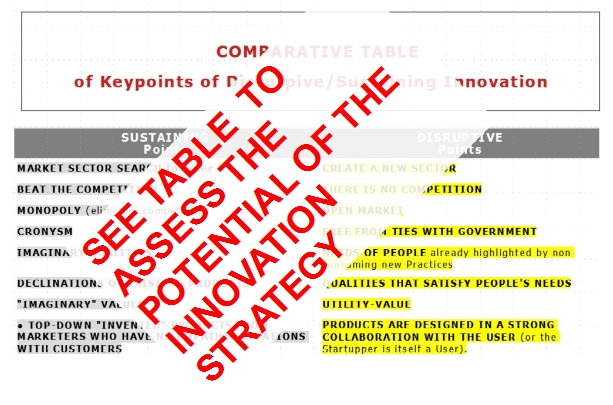Basically then there is a tendency to develop a false culture of disruptive innovation.
This happens not for pure bad faith, but because those who produce “Culture” of innovation (both as corporate strategies and as information) do not know at all the issue of radical innovation that is slowly changing the market.
In other words, it can be said that those who deal with the issues of Disruptive Innovation are literally not able to understand what they are talking about.
One of the consequences of this situation is that those who today talk about Disruptive Innovation do so by focusing on the negative factors related to it. This happens because, not knowing the matter thoroughly, they are not able to describe the positive aspects of the phenomenon.
Obviously those who do not know the process of restructuring a house, and see the initial stages of the process, will talk about it by describing negative aspects (such as destruction, loss of elements to which you were fond of, etc. …). But they will not be able to conceive (and therefore to describe) the positive, “constructive” aspects of the reconstruction phase.
One of the most significant cases of this culture incapable of understanding the essence of things, is the article “The Disruption Machine” (NewYorker, June 23, 2014) by Jill Lepore, in which the author identifies the Disruptive innovation with ” “the rhetoric of disruption — a language of panic, fear, asymmetry, and disorder“; e come “competitive strategy for an age seized by terror.”
The author is engaged in an ideological defense of the status quo of the Market, a legitimate thing in itself, but in this ideological condition, she is not able not only to see the “new things” that are emerging, but it was not even able to read who invented the definition of Disruptive innovation, Clayton Christensen, who wrote
“In retrospect, I made a poor choice when I used “disruption” to describe the phenomena that transformation so frequently stems from simple, cheap solutions. The word can confuse those who mistake my definition with the dictionary definition of “disruption.” In fact, in 1997, when I was at Intel summarizing my research, my friend Andy Grove said, “If you call it disruption, you will mislead the world.” Unfortunately, The Innovator’s Dilemma was already being printed, so it was too late.
The problem is that many assume that “disruption” and “different” are synonyms. They are not. Disruptions often don’t involve big technological breakthroughs. Rather, they involve mastering the intricate art of the simple solution.” [ “a Decade o disruption”, Forbes Oct 26, 2007}


